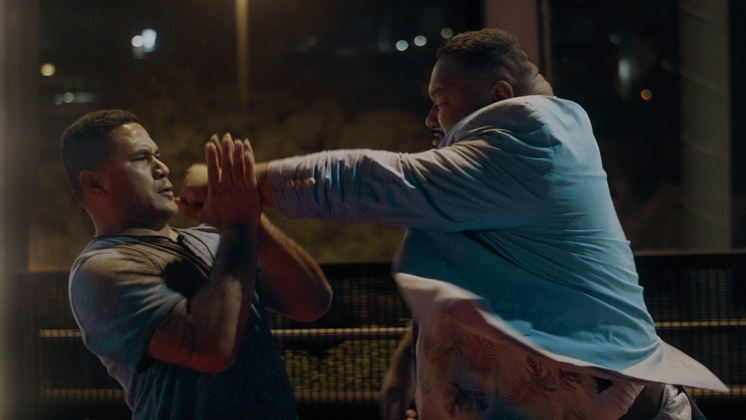You’ll forgive me if I wanted some murder, ya? I’ve watched too many Nazi films not to expect a body count. Ah, but this is before the big stuff and a little out of Indiana Jones’ league. The year is 1938 and Hitler is salivating over the Sudetenland like a Pavlovian Hellhound. History knows what happened. Every viewer should know what happens, but I won’t give it away just yet.
The story is not about Adolf Hitler (Ulrich Matthes) and British PM Neville Chamberlain (Jeremy Irons). Well, not really, at least. The focus is on two underlings, Hugh Legat (George MacKay, who has now graduated to WWII) and Paul von Hartmann (Jannis Niewöhner). Legat is Chamberlain’s secretary; von Hartmann is a translator in Germany’s foreign office department. Secretly, von Hartmann knows exactly how bloodthirsty Hitler is and belongs to a small team intent on removing him from power.
A couple of Hitler notes here: The Adolf Hitler portrayed is a clear parallel to Trump – completely full of himself without an ounce of a quality any normal human might call “attractive” or “endearing.” Well, except that this Hitler proclaims himself good at reading people (and proves it). Trump sucks at reading anybody but his sycophants.
Ulrich Matthes is –quite frankly- the worst-looking Hitler I’ve ever seen. The man may well be a quality actor, but he’s an absolute scarecrow. “Weird Al” Yankovic playing Hitler on an episode of “Drunk History” looked more like the real thing than Ulrich.
This is all just spygame foolishness. The crux of this film is for these two noobs to get Neville Chamberlain to thwart Hitler’s claim to Czechoslovakian land. Noble goal if completely unrealistic. In terms of pure naïveté, It’s akin to turning rural Alabama blue. But, hey, where there is danger, there’s plot, huh?
The hidden story of Munich: The Edge of War is the re-visitation of Neville Chamberlain’s role in the rise of Adolf Hitler. Modern history likes to condemn Chamberlain as a spineless toady who naïvely chose to appease a monster instead of standing up to him. These claims seem all the funnier coming from voices who backed and continue to back Trump. Munich takes a different view. I expected it to change the facts, or present them in a way that makes Chamberlain look less conciliatory. The film does no such thing; it instead explores the philosophy behind the negotiations which was anything but conciliatory. Chamberlain sees Hitler for exactly who he is, yet concludes, “We must play the cards we are dealt.” The film argues that Chamberlain’s appeasement was politically unavoidable and while his tactics may have seen weak at the time, they made the allies much better prepared to repel Hitler in the long run. In other words, Chamberlain, shrewd martyr, was playing the long con.
in the rise of Adolf Hitler. Modern history likes to condemn Chamberlain as a spineless toady who naïvely chose to appease a monster instead of standing up to him. These claims seem all the funnier coming from voices who backed and continue to back Trump. Munich takes a different view. I expected it to change the facts, or present them in a way that makes Chamberlain look less conciliatory. The film does no such thing; it instead explores the philosophy behind the negotiations which was anything but conciliatory. Chamberlain sees Hitler for exactly who he is, yet concludes, “We must play the cards we are dealt.” The film argues that Chamberlain’s appeasement was politically unavoidable and while his tactics may have seen weak at the time, they made the allies much better prepared to repel Hitler in the long run. In other words, Chamberlain, shrewd martyr, was playing the long con.
Do I buy that? Hard to say. It was certainly more believable coming from Jeremy Irons than a lesser actor.
Munich: The Edge of War reminded me a great deal of the Benedict Cumberbatch recent Cuban Missile Crisis spy thriller: The Courier. In both cases, there were spy novices charged with tasks far beyond their skill set. And in both cases, the film asked us to overlook that fact and imagine ourselves in the spy’s place – less a “what if you were James Bond?” as much as a “what if James Bond were you?” The denouement was a tad more anticlimactic than I‘m guessing the film had intended initially, which (I’m guessing) is why it bolstered the role of Chamberlain. But that’s just a guess, it could be that director Christian Schwochow made this piece entirely to vindicate Chamberlain. In any case, the film is a lackluster thriller, but a worthwhile take on history.
The Nazis were ready for battle
Treating the rest of Europe as cattle
But Neville was there
With spineless flair
Was there more to his obsequious prattle?
Rated PG-13, 130 Minutes
Director: Christian Schwochow
Writer: Ben Power
Genre: Look who’s spying now
Type of being most likely to enjoy this film: The Neville Chamberlain fan club
Type of being least likely to enjoy this film: Nazis, of course



